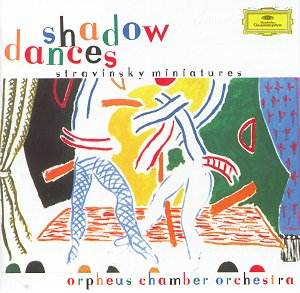
GUEST REVIEW
FROM INTERNATIONAL RECORD
REVIEW
STRAVINSKY
Shadow Dances.
Tangoa.
Suitesa - No. 1; No. 2. Concerto in
Db.
Concertinob.
Octetb. Three Pieces for String
Quarteta.
Praeludiuma.
Ragtimea.
Duetc. Fanfare for a New
Theatrec. Scherzo à la
Russea.
 Orpheus Chamber Orchestra.
Orpheus Chamber Orchestra.
Producer Christian Gansch. Engineer Wolf-Dieter Katwatky. Date
aApril 1996, bDecember 1995, cDecember
1996.
 DG 453 458-2 (full
price, 1 hour 7 minutes).
DG 453 458-2 (full
price, 1 hour 7 minutes).
Crotchet
Amazon
UK
Amazon
USA

For several years now the Orpheus Chamber Orchestra has been seditiously
demonstrating that a group of really fine, lively and imaginative
instrumentalists can easily do without a conductor. Doubters (if there still
are any) might object that the results will be efficient but characterless;
again and again Orpheus proves them wrong. Its method is to choose a
'concert-master' (normally a violinist) for each work but otherwise to make
democratic decisions about how a piece should go. There must be limits to
the repertory that such a method can encompass, but with one possible exception
those limits are not reached here. These are Stravinsky's miniatures, of
course, but each has its own pungent, often witty character that needs distilling
at maximum strength within a very brief space. The bright colours and brisk
rhythms of the two Suites are vividly caught, but so is the fact that in
each of these movements Stravinsky is trying on a fancy dress costume (a
Parisian flâneur, a circus ringmaster) or sketching a sly caricature.
The weird quirkiness of his scoring in the so-called 'orchestral' version
of the Scherzo à la russe and the 1953 revision of the Tango needs
to be emphasized, but who is more likely to notice - and enjoy - that oddity
than the players themselves?
'Miniature', of course, does not mean 'minor'. The Concerto in D is a small
classic of Stravinsky's balletic, neo-Tchaikovsky manner; the Three Pieces
for string quartet are crucial documents of his discovery of a path forward
from The Rite of Spring; while the Concertino, especially (as here) in its
1952 re-scoring, is a crossroads: the point at which paths from the Three
Pieces (and The Soldier's Tale, and the Symphonies of Wind Instruments) meet
and together point towards neo-Classicism and maybe beyond. All are given
first-class performances in a most sympathetic, spacious acoustic. And the
Octet is an exuberant masterpiece, of course; it is played with dapper good
humour and intelligent insight (the Moderato variation in the slow movement
a clear pre-echo of the Symphony of Psalms) but with slightly less incisive
character than the other works here; because it's a wind piece and thus no
string-player acted as concert-master? A richly enjoyable collection otherwise.
Reviewer
Michael Oliver
